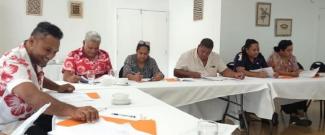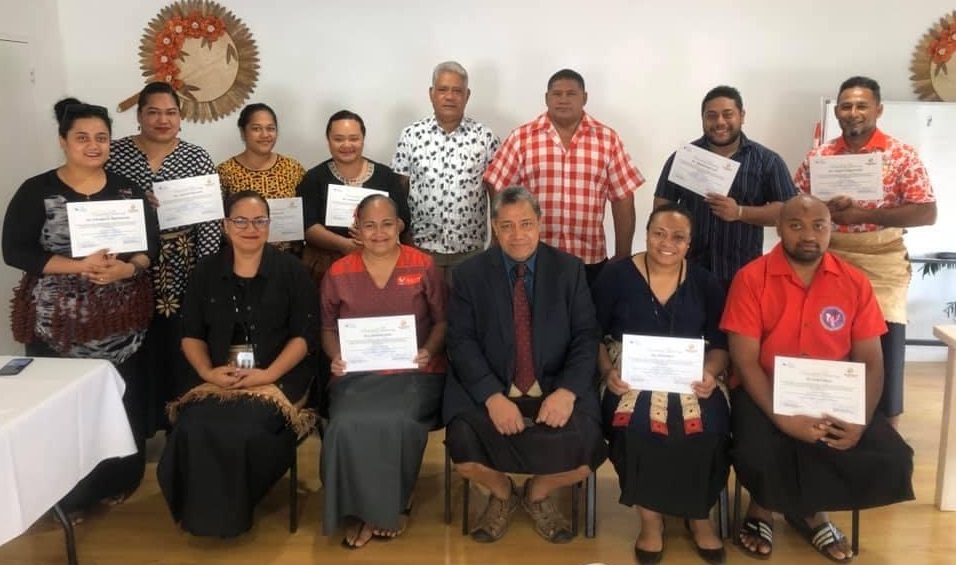
(disponible en anglais uniquement)
Tonga strengthens its medical laboratory handling services through certification of key officers
A group of 13 Tongan officers last month received 2-year certifications for laboratory specimen handling and shipment of infectious substances in accordance with International Air Transport Association (IATA) regulations. These certifications are an important step for strengthening laboratory services across the Pacific region. This service is especially critical during a pandemic as there is a need to refer samples across borders for testing and confirmation of diseases.
The training for this certification was supported by the Pacific Community (SPC) with funding provided by the European Union’s (EU) ‘Scale-up Public Health Surveillance Network Services to Strengthen Health Security in the Pacific’ project.
Initial training workshops organized by the SPC through the Pacific Public Health Surveillance Network (PPHSN) and funded by the Australian Department of Foreign Affairs and Trade (DFAT) took place in November 2019 with specialists from 9 national laboratories from across the Pacific taking part.
The Tonga Hospital Laboratory Services followed up in early 2021 with an in-country ‘Train the Trainer’ session to support its laboratory, local courier, and cargo handlers. The result is official international certification for Tongan shippers and handlers of infectious substances.
The training of trainers fulfils one of the key objectives for PPHSN: training & capacity development in public health laboratory services provided within this voluntary network of countries and organizations dedicated to the promotion of public health surveillance.
Principal Medical Scientist Telesia Apikotoa who took part in the 2019 training was proud to have been able to share her expertise in Tonga, “Tonga is made up of many small Islands and transportation of samples from outer Islands to Vaiola Hospital is a regular and continuous process, so the more certified handlers available in Tonga, the better. This training will improve our lab services by decreasing incidences where parcels are unnecessarily delayed due to improper packaging or incorrect labelling and documentation”.
Infectious substances require proper packaging as these substances are pathogens or micro-organisms such as bacteria and viruses which can cause diseases in humans and animals. Early laboratory diagnosis of infectious substances allows necessary action for awareness, control and further spread of infections.
SPC’s Senior Laboratory Advisor Dr Eka Buadromo highlighted the value of train the trainer programs both for Tonga and the entire region. “Training of trainers is a cost-effective mechanism when it comes to further developing in country capabilities and capacity building. In fact, it has come in handy during these unprecedented times where borders are closed, and we cannot travel. It is commendable to see the investment being made to ensure national public health laboratories have more certified staff for handling shipping of infectious substances ensuring.”
SPC is committed to expanding this program throughout the region and helping to create a large pool of regional expertise. Similar in-country trainings in other Pacific Islands will take place in 2021.

About PPHSN
The Pacific Public Health Surveillance Network (PPHSN) is a voluntary network of countries and organisations dedicated to the promotion of public health surveillance and appropriate response to the health challenges of 22 Pacific Island countries and territories (PICTs).
PPHSN was created 24 years ago in December 1996 under the joint auspices of the Pacific Community (SPC) and the World Health Organization (WHO) in close consultation with the 22 PICTs and several regional partners.
Its primary focus is communicable diseases, especially those prone to outbreaks, such as COVID-19 and dengue fever.
Over the past two decades, PPHSN has done a lot of work to reduce the risks and protect Pacific populations from infectious diseases. The network includes six key services to support Pacific Island countries and territories with the surveillance and response to outbreaks:
- PacNet (for alert and communication).
- Pacific Syndromic Surveillance System (for outbreak detection)
- LabNet (for disease verification and identification),
- EpiNet (for preparedness and response),
- PICNet (for infection prevention and control), and
- SHIP-DDM (for capacity building and strengthening).
